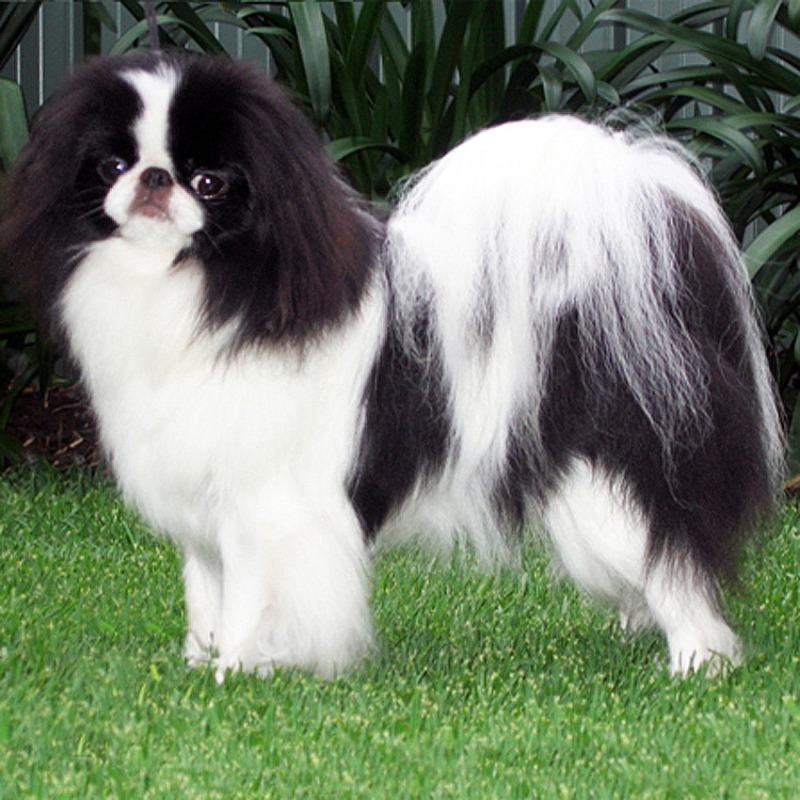Breeds
Japanese Chin

GROUP 1 - TOYS
Brief History
Many myths and legends exist regarding the origins of the Japanese Chin, but one of life's mysteries is why the Japanese Chin is still comparatively rare and unknown. Some say China, others attribute Korea and some even say Buddhist monks aided in his development. What is known, however, is that this little dog was introduced to Japan anywhere from 500 to 1000 years ago where he was fiercely protected by Japanese emperors and the aristocracy. The Chin was unknown in the West until 1854 when Japan reopened for trade after 200 years of isolation. Once in Europe he was the connoisseur’s choice and even had Royal patronage; Queen Alexandra owned 261 of them!
Average Life Span
When considering a dog, please realise that you are taking it on for its lifetime.
The average life span is 12 to 14 years.
Temperament
The Japanese Chin makes a fine companion. He is a sensitive and intelligent dog, albeit somewhat independent, whose only purpose in life is to exist as a companion. He is responsive and affectionate with those he knows and loves; he can be reserved with strangers or in new situations. Japanese Chins can also be stubborn and headstrong. They are amiable with other animals and although they make good watchdogs, they are not known to bark often. Japanese Chin are renowned for their impish antics and catlike nature.
Brief Breed Description
The Japanese Chin is a small, elegant, aristocratic toy dog with a distinctive Oriental expression. The head is large, the muzzle short, and the round, dark eyes convey, as Japanese Chin fans like to say, a “look of astonishment.” He has a profuse mane around the neck and shoulders, with a glorious plumed tail arching over the back. Japanese Chin come in two colours: red and white and black and white.
Coat and Care Requirements
The profuse but silky coat of the Japanese Chin gives him the appearance of a high-maintenance breed, but he is surprisingly easy to maintain in top condition. He will require brushing a few times a week and a bath every couple of weeks or so, depending on his living conditions. The breed’s nails grow very fast and should be trimmed regularly to keep them short and neat. Their ears should be checked regularly to avoid a build-up of wax and debris that can cause ear infections and teeth should be brushed frequently to avoid dental problems.
Sizes:
Weight: 1.8 to 3.2kgs.
Health
All breeds have individual health issues. When speaking to breeders it is recommended you enquire about the breed’s health and what health testing the breeder does. The Japanese Chin is generally a healthy breed, however health conditions do occur occasionally. These may include luxating patellas (slipping kneecaps), cataracts, and early-onset heart murmurs. The Japanese Chin has a short, flattened face, which can cause heart and breathing problems in extreme situations and severe weather. Symptoms to be aware of are shortness of breath, coughing, difficulty breathing, fatigue and weight loss.
Suitability
Japanese Chin are ideal pets for singles and families alike. As with all dogs, young children and pets should always be supervised when together. They are usually good with other dogs and cats, once acquainted and if socialised well as a puppy. Whilst they keep themselves busy, a short walk is appreciated. Long periods of exercise are not required and thus he suits life in an apartment, ideal for the elderly or those that just appreciate a relaxed way of life.
In Conclusion
Now you know a little more about this breed. If you have decided this is the dog for you and wish to investigate further, please contact the Breed Club or Dogs Victoria. They will be able to give you information about available puppies and also suggest dog events where you can see the breed and speak to breeders. In this way you will gain a better perspective of the breed and its needs. With any breed of dog, it is important to research and determine suitability for your lifestyle before committing to a puppy which will be a part of your family for many years to come.
Whilst many breeds are recommended for families, it is imperative that when children are with dogs they are supervised at all times. Basic obedience training is a vital part of dog ownership.
Dogs Victoria is about the responsible ownership of all dogs and in particular, the preservation of pure breeds.
Link to Dogs Australia Breed Standard: https://dogsaustralia.org.au/breed/detail/25
Breeders
Sorry, there are currently no breeders advertising for this breed. If you are a registered Dogs Victoria breeder and wish to advertise here please create an advertisement here.


